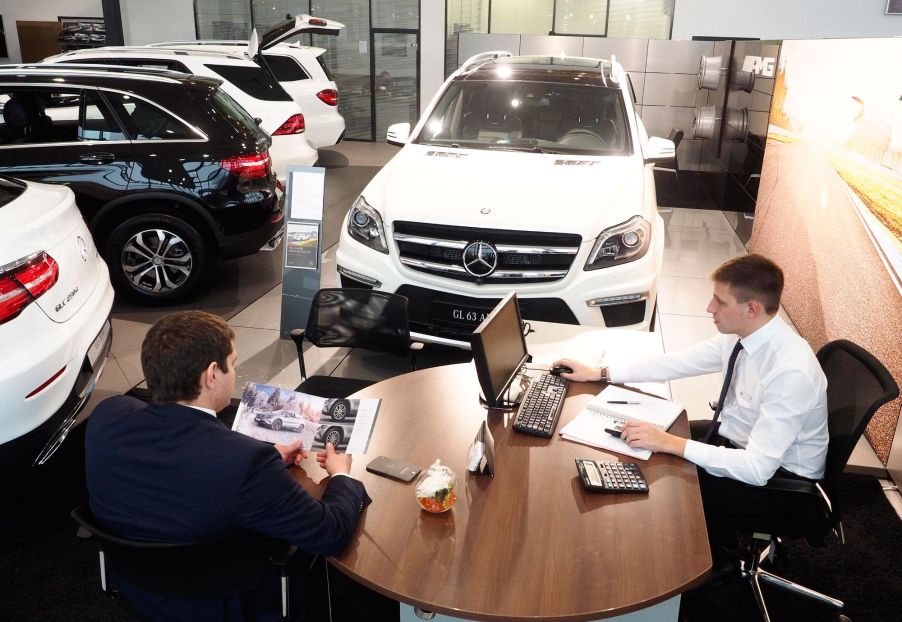
Dealership Lingo That You Should Know Before Stepping Into the Showroom
Shopping for a new or used car at a dealership is a daunting experience. You spend hours sitting at a salesperson’s desk sipping coffee while waiting for them to talk to their manager. During that time, you might hear them say a few things that sound they’re speaking in code. In order to clear up some of that mysterious dealership lingo, here are a few terms you should know before stepping foot onto the showroom floor.
Here are some of the most common dealership phrases

Even some of the most basic terms in a car deal can sound confusing if you have never heard them before. But it’s always good to know them before getting into a back-and-forth conversation with a salesperson about pricing or the car itself. Here are some of the most common terms you’ll come across:
- MSRP: This stands for “Manufacturer’s Suggested Retail Price.” The MSRP is the price that the manufacturer recommends that the dealer should sell the car for. It’s also known as the car’s “sticker price” as it’s the price shown on the window sticker from the manufacturer.
- Make or Model: The “make” is the brand of the manufacturer that built the car, while the “model” refers to the name of the car itself. For example, “Honda” is the make of the car and “Civic” is the model name.
- Dealer invoice: This is the price that the dealership pays the manufacturer for the car. This is essentially the base price that the dealer then marks up in order to make a profit.
- F&I: This stands for “finance and insurance.” This is the part of the dealership where you’ll sign the paperwork for the car and purchase any extra warranties or services.
- Money Factor: This one pertains to leasing, it’s basically the interest rate that you’ll be charged on a monthly basis as part of the car’s lease payment. Just like an interest rate in financing, the lower the money factor the better the deal.
The following terms were just some of the most basic words and terms that you might hear during the course of an entire car deal. Now, let’s get into some more in-house terms that you might hear car salespeople throw around while you’re hanging out in a dealership.
Terms that car salespeople use around each other

Here are some common salespeople terms you might hear if you hang around a dealership long enough:
- Be-back: A customer that leaves the lot and tells the salesperson that they’ll “be back” later.
- Demo: Another term for “test drive”
- First pencil: This is first pricing offer from the salesperson for the car that you’re buying. If you don’t like the terms and want to negotiate, then you’ll end up seeing a “second or third pencil” as well.
- Spiff: A kick-back or payment between salespeople or from the sales manager to the salesperson, typically as an incentive for selling a car.
- Voucher: This refers to a commission voucher that sales people get after selling a car so that they know how much they made on the deal.
If you want to learn how to put sentences together using these newfound terms, then here is an example from Edmunds:
When you sit down to talk about the pricing for the car, you can tell the salesperson:
“Do you want to post another unit on the board? Give it to me for a nickel back of the invoice. You can make a nice voucher and spiff the F&I guy for prepping the docs.”
What you basically told the salesperson is that you’ll make the car deal for $500 under the invoice price, that way, they can sell another car and even spiff the finance manager. It’s a pretty good line considering you’ll sound like you know what you’re talking about and you’ll put the ball in their court when it comes to pricing and, ultimately, selling the car.
Will knowing these phrases land me a better deal on a car?

Maybe. We can’t make any promises that knowing some of the dealership lingo will help you get a better deal on a car. But knowing these terms will at least clear up any confusion you might have during the car deal. After all, it’s like understanding another language and when it comes to car shopping, knowledge is power and, possibly, more money saved.



